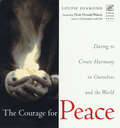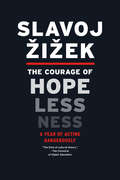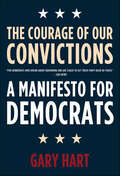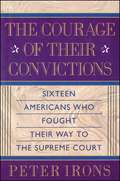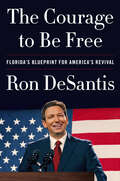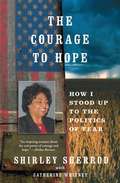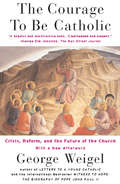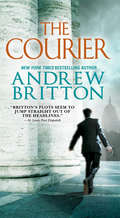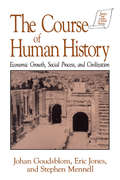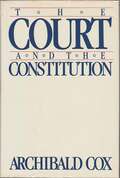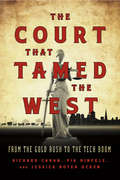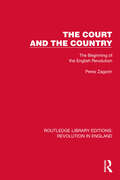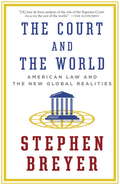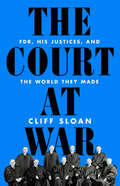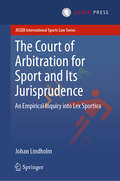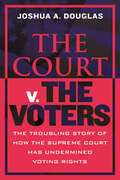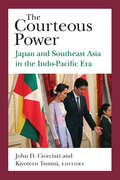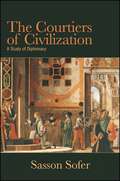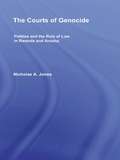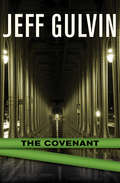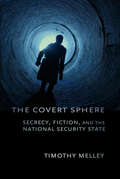- Table View
- List View
The Courage for Peace
by Louise Diamond Gerry ClowDiamond has traveled the world on her quest to promote peace and end the violence that tears families, towns, and nations apart. Based on her life's work and that of other peace builders, Diamond has uncovered four spiritual principles that create the essential foundation for peace. A fascinating and thoughtful expose, The Courage for Peace deals with peace on every level and takes us from the room of a little boy who sleeps with a toy rifle to the unrest in the Balkans, and finally to the devastating increase of violence in our communities and what we must do about it now. With information on scores of peacemaking organizations, this book is truly a call to save the world, one action at a time. From schoolyards to war zones, the issue of peace has never been more crucial. We are bombarded daily with headlines and televised imagery reminding us that people all over the world are suffering in many different ways, not only in Kosovo and Kashmir.
The Courage of Hopelessness: Chronicles Of A Year Of Acting Dangerously
by Slavoj ZizekIn THE COURAGE OF HOPELESSNESS, maverick philosopher Slavoj Zizek returns to explore today's ideological, political and economic battles, and asks whether radical change is possible.In these troubled times, even the most pessimistic diagnosis of our future ends with an uplifting hint that things might not be as bad as all that, that there is light at the end of the tunnel. Yet, argues Slavoj Žižek, it is only when we have admitted to ourselves that our situation is completely hopeless - that the light at the end of the tunnel is in fact the headlight of a train - that fundamental change can be brought about.
The Courage of Our Convictions: A Manifesto for Democrats
by Gary HartAn impassioned call to arms for Democrats to embrace the principles that made the party and the country great—a true moral vision for leadership at home and abroadIn this powerful and provocative manifesto, a cri de coeur for Democrats who have grown increasingly frustrated with their party's leaders, former senator Gary Hart takes the Democrats to task for choosing caution and calculation in place of moral principles. That path, Hart says, will lead only to sorrow—for the party and for the country.The Courage of Our Convictions is Hart's call to action—a clear-eyed and plainspoken manifesto that urges a return to the principles bequeathed to the party by its great twentieth-century presidents: Franklin D. Roosevelt's commitment to a single national community, where no American would be left behind; Harry S. Truman's internationalism, which preserved democracy after World War II and led eventually to the defeat of communism; John F. Kennedy's ideal of civic duty and service to the nation; and Lyndon B. Johnson's insistence on equality for all our citizens.As the midterm elections approach—and with the 2008 presidential election just over the horizon—Hart speaks directly and passionately to the many Democrats who seek a principled change of leadership in Washington. It is the wake-up call that so many Americans have been waiting for.
The Courage of Their Convictions
by Peter H. IronsSixteen landmark civil liberties cases and the stories of the ordinary Americans who had the courage to challenge the law and test the Constitution are re-created. Issues include: school prayer, sexual privacy, political protest, pregnancy and the right to work, acts of racial and religious discrimination, and more.
The Courage to Be Free: Florida's Blueprint for America's Revival
by Ron DeSantisNo American leader has accomplished more for his state than Governor Ron DeSantis. Now he reveals how he did it. <p><P>He played baseball for Yale, graduated with honors from Harvard Law School, and served in Iraq and in the halls of Congress. But in all these places, Ron DeSantis learned the same lesson: He didn’t want to be part of the leftist elite. <p><P>His heart was always for the people of Florida, one of the most diverse and culturally rich states in the union. Since becoming governor of the Sunshine State, he has fought—and won—battle after battle, defeating not just opposition from the political left, but a barrage of hostile media coverage proclaiming the end of the world. <p><p>When he implemented COVID-19 policies based on evidence and focused on freedoms, the press launched a smear campaign against him, yet Florida’s economy thrived, its education system outperformed the nation, and Florida’s COVID mortality rate for seniors was lower than that in thirty-eight states. When he enacted policies to keep leftist political concepts like critical race theory and woke gender ideology out of Florida’s classrooms, the media demagogued his actions, but parents across Florida rallied to his cause. Dishonest attacks from the media don’t deter him. In fact, DeSantis keeps racking up wins for Floridians. In 2022, the governor delivered a historic, record-setting victory, winning by nearly 20 points and more than 1.5 million votes. <p><p>A firsthand account from the blue-collar boy who grew up to take on Disney and Dr. Fauci, The Courage to Be Free delivers something rare from an elected leader: stories of victory. This book is a winning blueprint for patriots across the country. And it is a rallying cry for every American who wishes to preserve our liberties. <p> <b>New York Times Bestseller</b>
The Courage to Hope
by Catherine Whitney Shirley SherrodIn the summer of 2010, Shirley Sherrod was catapulted into a media storm that blew apart her life and her job doing what she'd done for decades: helping poor, hardworking people live the American dream. She was a lifelong activist who served as Georgia's first black director of rural development. A right-wing blogger, the now late Andrew Breitbart, disseminated a video clip of a speech Sherrod had given to the Georgia NAACP, intending to make her an example of "reverse racism." The right-wing media ramped up the outrage, and before Sherrod had a chance to defend herself, the Obama administration demanded her resignation. Then, after hearing from Sherrod herself and learning the entire truth of what she said in that speech, the administration tried to backtrack. As public officials and media professionals admitted to being duped and apologized for their rush to judgment, Sherrod found herself the subject of a teachable moment. The Courage to Hope addresses this regret-table episode in American politics, but it also tells Sherrod's own story of growing up on a farm in southwest Georgia during the final violent years of Jim Crow. As a child she dreamed of leaving the South, but when her father was murdered by a white neighbor who was never brought to justice, Sherrod made a vow to stay in Georgia and commit herself to the cause of truth and racial healing. With her husband, Charles, a legend in the civil rights movement, she has devoted her life to empowering poor people and rural communities--Americans who are most in need. The incident that brought Sherrod into the spotlight does not define her life and work, but it strengthens her commitment to stand against the politics of fear and have the courage to hope.
The Courage to be Catholic: Crisis, Reform And The Future Of The Church
by George WeigelWeigel is a Catholic theologian, a senior fellow at the Ethics and Policy Center in Washington, D. C. , and one of America's leading commentators on religion and public life. He sees the current crisis in Catholic life as an opportunity to deepen the reforms of the Catholic Church begun by the Second Vatican Council in 1962-1965, by returning to the sources of Catholic faith. He examines what today's Catholic crisis isand is nothow it came about, and how the crisis might become a great moment of reform for seminaries and novitates, the priesthood, the bishops and the Vatican, and the laity. Annotation c. Book News, Inc. , Portland, OR (booknews. com)
The Courage to be Catholic: Crisis, Reform, and the Future of the Church
by George WeigelHow the Church can withstand recent scandals and problems.
The Courier (A Ryan Kealey Thriller #6)
by Andrew Britton"May well give Tom Clancy a run for the money." -St. Louis Post-Dispatch "Breakneck Pacing." --Publishers Weekly on The OperativeRyan Kealey now knows he'll never really put the game behind him. He's seen too much, and the instinct is too deeply hardwired. But the game itself has changed. Between tense interagency "cooperation" that gums the works, and an overreliance on data-crunching and wiz-kid tech, today's US intelligence service has lost a step to its ever-bolder, viciously adaptable global enemies. And thanks to an incredible discovery in the Arctic, those enemies now have a nuke--capable of unleashing unthinkable terror. To hunt down the devastating package before it can be used, Kealey forms an unlikely partnership with the young Farsi-speaking nuclear physicist Rayhan Jafari. But once on the ground, with technology and their by-the-numbers command failing them, they're on their own--trusting only their guts and each other--to conduct the dirty business of combating horrific destruction. "No-holds-barred action and gripping suspense." --Library Journal on The Exile"The 'best' of Tom Clancy, Michael Connelly, and Robert Ludlum all rolled into a single book." --armchairinterviews.com on The Assassin
The Course of Human History: Civilization and Social Process (Sources And Studies In World History Ser.)
by Stephen Mennell David M Jones Johan GoudsblomThis text explores four major features of human society in their ecological and historical context: the origins of priests and organised religion; the rise of military men in an agrarian society; economic expansion and growth; and civilising and decivilising trends over time.
The Court And The Constitution
by Archibald S. CoxFrom Marbury vs. Madison to civil rights and abortion, this volume chronicles the issues, the debates, and the individuals who have kept the Constitution vital and, in doing so, have shaped American history
The Court That Tamed the West: From the Gold Rush to the Tech Boom
by Richard Cahan Pia Hinckle Jessica Royer OckenThis unique history reveals how a century of Federal Court drama and influential rulings shaped the development and culture of Northern California. From the gold rush to the Internet boom, the US District Court for the Northern District of California has played a major role in how business is done and life is lived on the Pacific Coast. When California was first admitted to the Union, pioneers were busy prospecting for new fortunes, building towns and cities—and suing each other. San Francisco became the epicenter of a litigious new world of fortune-seekers and corporate interests. Northern California&’s federal court set precedents on issues ranging from shanghaied sailors to Mexican land grants and the civil rights of Chinese immigrants. Through the era of Prohibition and the labor movement to World War II and the tumultuous sixties and seventies, the court's historic rulings have defined the Bay Area's geography, culture, and commerce.
The Court and the Country: The Beginning of the English Revolution (Routledge Library Editions: Revolution in England #3)
by Perez ZagorinThe Court and the Country (1969) offers a fresh view and synthesis of the English revolution of 1640. It describes the origin and development of the revolution, and gives an account of the various factors – political, social and religious – that produced the revolution and conditioned its course. It explains the revolution primarily as a result of the breakdown of the unity of the governing class around the monarchy into the contending sides of the Court and the Country. A principal theme is the formation within the governing class of an opposition movement to the Crown. The role of Puritanism and of the towns is examined, and the resistance to Charles I is considered in relation to other European revolutions of the period.
The Court and the World
by Stephen BreyerIn this original, far-reaching, and timely book, Justice Stephen Breyer examines the work of the Supreme Court of the United States in an increasingly interconnected world, a world in which all sorts of activity, both public and private--from the conduct of national security policy to the conduct of international trade--obliges the Court to understand and consider circumstances beyond America's borders. It is a world of instant communications, lightning-fast commerce, and shared problems (like public health threats and environmental degradation), and it is one in which the lives of Americans are routinely linked ever more pervasively to those of people in foreign lands. Indeed, at a moment when anyone may engage in direct transactions internationally for services previously bought and sold only locally (lodging, for instance, through online sites), it has become clear that, even in ordinary matters, judicial awareness can no longer stop at the water's edge. To trace how foreign considerations have come to inform the thinking of the Court, Justice Breyer begins with that area of the law in which they have always figured prominently: national security in its constitutional dimension--how should the Court balance this imperative with others, chiefly the protection of basic liberties, in its review of presidential and congressional actions? He goes on to show that as the world has grown steadily "smaller," the Court's horizons have inevitably expanded: it has been obliged to consider a great many more matters that now cross borders. What is the geographical reach of an American statute concerning, say, securities fraud, antitrust violations, or copyright protections? And in deciding such matters, can the Court interpret American laws so that they might work more efficiently with similar laws in other nations?While Americans must necessarily determine their own laws through democratic process, increasingly, the smooth operation of American law--and, by extension, the advancement of American interests and values--depends on its working in harmony with that of other jurisdictions. Justice Breyer describes how the aim of cultivating such harmony, as well as the expansion of the rule of law overall, with its attendant benefits, has drawn American jurists into the relatively new role of "constitutional diplomats," a little remarked but increasingly important job for them in this fast-changing world. Written with unique authority and perspective, The Court and the World reveals an emergent reality few Americans observe directly but one that affects the life of every one of us. Here is an invaluable understanding for lawyers and non-lawyers alike.From the Hardcover edition.
The Court and the World: American Law and the New Global Realities
by Stephen BreyerIn this original, far-reaching, and timely book, Justice Stephen Breyer examines the work of the Supreme Court of the United States in an increasingly interconnected world, a world in which all sorts of activity, both public and private--from the conduct of national security policy to the conduct of international trade--obliges the Court to understand and consider circumstances beyond America's borders. It is a world of instant communications, lightning-fast commerce, and shared problems (like public health threats and environmental degradation), and it is one in which the lives of Americans are routinely linked ever more pervasively to those of people in foreign lands. Indeed, at a moment when anyone may engage in direct transactions internationally for services previously bought and sold only locally (lodging, for instance, through online sites), it has become clear that, even in ordinary matters, judicial awareness can no longer stop at the water's edge. To trace how foreign considerations have come to inform the thinking of the Court, Justice Breyer begins with that area of the law in which they have always figured prominently: national security in its constitutional dimension--how should the Court balance this imperative with others, chiefly the protection of basic liberties, in its review of presidential and congressional actions? He goes on to show that as the world has grown steadily "smaller," the Court's horizons have inevitably expanded: it has been obliged to consider a great many more matters that now cross borders. What is the geographical reach of an American statute concerning, say, securities fraud, antitrust violations, or copyright protections? And in deciding such matters, can the Court interpret American laws so that they might work more efficiently with similar laws in other nations?While Americans must necessarily determine their own laws through democratic process, increasingly, the smooth operation of American law--and, by extension, the advancement of American interests and values--depends on its working in harmony with that of other jurisdictions. Justice Breyer describes how the aim of cultivating such harmony, as well as the expansion of the rule of law overall, with its attendant benefits, has drawn American jurists into the relatively new role of "constitutional diplomats," a little remarked but increasingly important job for them in this fast-changing world. Written with unique authority and perspective, The Court and the World reveals an emergent reality few Americans observe directly but one that affects the life of every one of us. Here is an invaluable understanding for lawyers and non-lawyers alike.From the Hardcover edition.
The Court at War: FDR, His Justices, and the World They Made
by Cliff SloanThe inside story of how one president forever altered the most powerful legal institution in the country—with consequences that endure today By the summer of 1941, in the ninth year of his presidency, Franklin Roosevelt had molded his Court. He had appointed seven of the nine justices—the most by any president except George Washington—and handpicked the chief justice. But the wartime Roosevelt Court had two faces. One was bold and progressive, the other supine and abject, cowed by the charisma of the revered president. The Court at War explores this pivotal period. It provides a cast of unforgettable characters in the justices—from the mercurial, Vienna-born intellectual Felix Frankfurter to the Alabama populist Hugo Black; from the western prodigy William O. Douglas, FDR&’s initial pick to be his running mate in 1944, to Roosevelt&’s former attorney general and Nuremberg prosecutor Robert Jackson. The justices&’ shameless capitulation and unwillingness to cross their beloved president highlight the dangers of an unseemly closeness between Supreme Court justices and their political patrons. But the FDR Court&’s finest moments also provided a robust defense of individual rights, rights the current Court has put in jeopardy. Sloan&’s intimate portrait is a vivid, instructive tale for modern times.
The Court of Arbitration for Sport and Its Jurisprudence: An Empirical Inquiry into Lex Sportiva (ASSER International Sports Law Series)
by Johan LindholmThis book takes a close look at the Court of Arbitration for Sport (CAS), challenging existing claims and answering previously unanswered questions, by considering all of its publicly available decisions, both in its entirety as a body of jurisprudence and on a case-by-case level.It also investigates the actors involved in adjudication before the CAS, both the parties that bring disputes before the CAS and the arbitrators that resolve them, and in so doing establish precedents that govern sports generally.While the book relies upon and includes more traditional legal theory and analysis, it combines this with an empirical analysis of a large portion of the CAS's decisions. Hereby it relies upon and relates to the theory of the development of a transnational legal order in sports, the lex sportiva.The publication is targeted at and will benefit those professionally working in or interested in the fields of sports law, arbitration law, transnational law, or empirical legal studies.Johan Lindholm is a Professor of Law at Umeå University in Sweden.
The Court v. The Voters: The Troubling Story of How the Supreme Court Has Undermined Voting Rights
by Joshua A. DouglasAn urgent and gripping look at the erosion of voting rights and its implications for democracy, told through the stories of 9 Supreme Court decisions—and the next looming case In The Court v. The Voters, law professor Joshua Douglas takes us behind the scenes of significant cases in voting rights—some surprising and unknown, some familiar—to investigate the historic crossroads that have irrevocably changed our elections and the nation. In crisp and accessible prose, Douglas tells the story of each case, sheds light on the intractable election problems we face as a result, and highlights the unique role the highest court has played in producing a broken electoral system. Douglas charts infamous cases like: Bush v. Gore, which opened the door to many election law claimsCitizens United, which contributed to skewed representation—but perhaps not in the way you might thinkShelby County v. Holder, which gutted the vital protections of the Voting Rights ActCrawford v. Marion County Elections Board, which allowed states to enforce voter ID laws and make it harder for people to vote The Court v. The Voters powerfully reminds us of the tangible, real-world effects from the Court&’s voting rights decisions. While we can—and should—lament the democracy that might have been, Douglas argues that we can—and should—double down in our efforts to protect the right to vote.
The Court vs. Congress: Prayer, Busing, and Abortion
by Edward Keynes Randall K. MillerSince the early 1960s the Supreme Court and its congressional critics have been locked in a continuing dispute over the issues of school prayer, busing, and abortion. Although for years the Court's congressional foes have introduced legislation designed to curb the powers of the federal courts in these areas, they have until now failed to enact such proposals. It is likely that these legislative efforts and the present confrontation with the Court will continue.Edward Keynes and Randall Miller argue that Congress lacks the constitutional power to legislate away the powers of the federal courts and to prevent individuals from seeking redress for presumed infringements of their constitutional rights in these areas. They demonstrate that neither the framers nor ratifiers of the Constitution intended the Congress to exercise plenary power over the appellate jurisdiction of the Supreme Court. Throughout its history the Court has never conceded unlimited powers to Congress; and until the late 1950s Congress had not attempted to gerrymander the Court's jurisdiction in response to specific decisions. But the authors contend this is just what the sponsors of recent legislative attacks on the Court intend, and they see such efforts as threatening the Court's independence and authority as defined in the separation of powers clauses of the Constitution.
The Courteous Power: Japan and Southeast Asia in the Indo-Pacific Era (Michigan Monograph Series in Japanese Studies #92)
by John D. Ciorciari and Kiyoteru TsutsuiThe Courteous Power seeks to provide a nuanced view of the current relationship between Japan and Southeast Asia. Much of the current scholarship on East–Southeast Asian engagement has focused on the multidimensional chess game playing out between China and Japan, as the dominant post-imperialist powers. Alternatively, there has been renewed attention on ASEAN and other Southeast Asian–centered initiatives, explicitly minimizing the influence of East Asia in the region. Given the urgency of understanding the careful balance in the Indo-Pacific region, this volume brings together scholars to examine the history and current engagement from a variety of perspectives, ranging from economic and political, to the cultural and technological, while also focusing more clearly on the specific relationship between the region and Japan.
The Courtiers of Civilization: A Study of Diplomacy
by Sasson SoferThe professional diplomat frequently takes a back seat in the public imagination to such figures as the great heads of state and leading military figures. In The Courtiers of Civilization, Sasson Sofer aims to restore the importance and reputation of the diplomat in Western civilization. Drawing on an exhaustive reading of the vast literature on diplomacy, from the late Renaissance forward, he fashions an engaging portrait of the diplomat's milieu and lifestyle, his place in diplomatic rituals, and his role in international dialogue. Blending historical evidence, sociological analysis, and political thought, Sofer explores the vocational predicament faced by the diplomat, who must play many roles, including negotiator, honorable spy, horse trader, appeaser, and bureaucrat, while at the same time maneuvering in the world of rulers and warriors. Ultimately, the diplomat is a symbol of peace and a custodian of the virtues and norms of a civilized and functional international society—in sum a "courtier of civilization."
The Courts of Genocide: Politics and the Rule of Law in Rwanda and Arusha
by Nicholas JonesThe Courts of Genocide focuses on the judicial response to the genocide in Rwanda in order to address the search for justice following mass atrocities. The central concern of the book is how the politics of justice can get in the way of its administration. Considering both the ICTR (International Criminal tribunal for Rwanda), and all of the politics surrounding its work, and the Rwandan approach (the Gacaca courts and the national judiciary) and the politics that surround it, The Courts of Genocide addresses the relationship between these three 'courts' which, whilst oriented by similar concerns, stand in stark opposition to each other. In this respect, the book addresses a series of questions, including: What aspects of the Rwandan genocide itself played a role in directing the judicial response that has been adopted? On what basis did the government of Rwanda decide to address the genocide in a legalistic manner? Around what goals has each judicial response been organized? What are the specific procedures and processes of this response? And, finally, what challenges does its multifaceted character create for those involved in its operation, well as for Rwandan society? Addressing conceptual issues of restorative and retributive justice, liberal legalism and cosmopolitan law, The Courts of Genocide constitutes a substantially grounded reflection upon the problem of 'doing justice' after genocide.
The Courts, the Charter, and the Schools
by Michael Manley-Casimir Kristen Manley-CasimirThe adoption of the Canadian Constitution Act in 1982, with its embedded Charter of Rights and Freedoms, ushered in an era of unprecedented judicial influence on Canada's public policy. The Courts, the Charter, and the Schools examines how the Constitution Act has affected educational policy during the first twenty-five years of the Charter by analyzing landmark rulings handed down from appellate courts and the Supreme Court.The contributors consider the influence that Charter cases have had on educational policies and practices by discussing cases involving fundamental freedoms, legal rights, equality rights, and minority language rights. Demonstrating why and how the Charter was invoked, interpreted, and applied in each of these cases, this volume also highlights the resulting consequences for Canada's public schools. An illuminating collection of essays by prominent legal scholars and educational commentators, The Courts, the Charter, and the Schools is a significant contribution to the study of educational law and policy in Canada.
The Covenant
by Jeff GulvinThe Scotland Yard Detective and FBI Agent trace a link between an alt-right militia and the CIA&’s hunt for Osama bin Laden in this pre-9/11 thriller. A CIA agent hunts Osama bin Laden in Afghanistan. A female sergeant is assassinated in London. A Japanese terrorist is detonating bombs across Washington, DC And in Texas, a serial killer is murdering transients who ride the rails, until—either by mistake or design—an ill-fated English tourist is counted among the victims. Scotland Yard&’s top anti-terrorism expert, Jack Swann, and his friend, FBI Special Agent Johnny Harrison, are about to find a frightening connection between these seemingly random events. A secessionist militia in America&’s heartland is amassing an army for a coming civil war calculated to divide and destroy the United States. And their next two targets are the only two men who can stop the explosive plan from going off. Written before the events of September 11, The Covenant is a prescient view of international politics, espionage, terrorism, and the rise of the alt-right in the twenty-first century. Jeff Gulvin&’s extensive research and contacts within the FBI and London&’s Special Branch bring unerring authenticity to his Jack Swann novels, Nom de Guerre, and Storm Crow, which New York Times–bestselling author Jack Higgins called &“absolutely marvelous. One of the best thrillers I&’ve read this year.&”
The Covert Sphere: secrecy, fiction, and the national security state
by Timothy MelleyIn December 2010 the U.S. Embassy in Kabul acknowledged that it was providing major funding for thirteen episodes of Eagle Four-a new Afghani television melodrama based loosely on the blockbuster U.S. series 24. According to an embassy spokesperson, Eagle Four was part of a strategy aimed at transforming public suspicion of security forces into something like awed respect. Why would a wartime government spend valuable resources on a melodrama of covert operations? The answer, according to Timothy Melley, is not simply that fiction has real political effects but that, since the Cold War, fiction has become integral to the growth of national security as a concept and a transformation of democracy. In The Covert Sphere, Melley links this cultural shift to the birth of the national security state in 1947. As the United States developed a vast infrastructure of clandestine organizations, it shielded policy from the public sphere and gave rise to a new cultural imaginary, "the covert sphere." One of the surprising consequences of state secrecy is that citizens must rely substantially on fiction to "know," or imagine, their nation's foreign policy. The potent combination of institutional secrecy and public fascination with the secret work of the state was instrumental in fostering the culture of suspicion and uncertainty that has plagued American society ever since-and, Melley argues, that would eventually find its fullest expression in postmodernism. The Covert Sphere traces these consequences from the Korean War through the War on Terror, examining how a regime of psychological operations and covert action has made the conflation of reality and fiction a central feature of both U.S. foreign policy and American culture. Melley interweaves Cold War history with political theory and original readings of films, television dramas, and popular entertainments-from The Manchurian Candidate through 24-as well as influential writing by Margaret Atwood, Robert Coover, Don DeLillo, Joan Didion, E. L. Doctorow, Michael Herr, Denis Johnson, Norman Mailer, Tim O'Brien, and many others.
